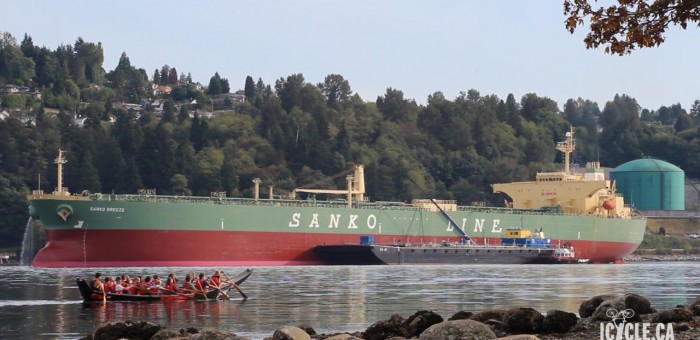Responding to government spill response measures
Today the BC Government announced its second phase of regulations to improve preparedness, response and recovery from potential spills. As part of this announcement, restrictions have been put in place to ensure that there will be no increased transport of diluted bitumen (dilbit) in British Columbia until the fate and behaviour of a dilbit spill is better understood scientifically and there is adequate ability to clean up such a spill.
My colleagues and I are very pleased with this announcement. Those who have been following developments on this file will know that I spent an enormous amount of time serving as an intervenor as part of the National Energy Board hearings on the Transmountain pipeline expansion. In fact, in December 2013, we called on the then BC Liberal government to impose a moratorium on dilbit transport on our coast due to the inadequacy of British Coumbia’s spill response and uncertainty in the scientific understanding of fate and behaviour of a dilbit spill. This was further emphasized in my final argument, oral testimony and open letter to Prime Minister Trudeau.
Below I reproduce the press release that we issued in support of the government’s announcement.
Media Release
Weaver responds to government spill response measures
For immediate release
January 30, 2018
VICTORIA, B.C. – Andrew Weaver, leader of the B.C. Green Party, responded today to Minister George Heyman’s announcement that the government is proposing additional measures to protect our environment and coastal waters from heavy oil spills.
“I am pleased to see Minister Heyman putting evidence and science front and centre in government decision-making where it belongs,” said Weaver.
“In particular, I welcome the independent scientific advisory panel that will be established to assess whether regulations can mitigate the impact of heavy oil spills in our precious coastal waters. Our coastal waters provide significant economic activity for our province and the entire country, be it from tourism, fishing or real estate, and are of great cultural significance to First Nations. It is essential that they be adequately protected.
“For several years my office participated extensively in the NEB hearing process for the TransMountain pipeline. We presented evidence from two independent expert assessments that validated our evidence by making it abundantly clear that we simply to not know enough to properly assess the risk and potential damages associated with a diluted bitumen spill in the Salish Sea.
“I look forward to the new panel providing complete, robust and accurate information on this matter to the Minister that reinforces what which we already know – that there is no way currently to adequately respond to a spill of diluted bitumen.
“Furthermore, I am pleased that the government will examine important issues like response times, geographically-specific response needs for our diverse province and compensation for loss of public and cultural use of land, resources or public amenities. B.C. has a rich history of sustainable natural resource development, but it must be done in a way that benefits British Columbians. We must ensure that we are not putting our economy and our communities at risk.”
Weaver was the only MLA to intervene as an individual in the National Energy Board hearings on the TransMountain pipeline expansion. His office was an active participant in the NEB hearing process and submitted a comprehensive report outlining major issues with the spill response regime. Adam Olsen, now Green Party MLA for Saanich North and the Islands, also intervened as a member of the Tsartlip First Nation.
-30-
Background:
The reports referenced above are:
- The Royal Society of Canada Expert Panel Report entitled: The Behaviour and Environmental Impact of Crude Oil Released in Aqueous Environments;
- The US National Academy of Science’s report entitled: Spills of Diluted Bitumen from Pipelines: A Comparative Study of Environmental Fate, Effects, and Response.
Media contact
Jillian Oliver, Press Secretary
+1 778-650-0597 | jillian.oliver@leg.bc.ca





One Comment
About a year ago I was shocked and dismayed upon learning that dilbit is currently being pumped into vessels, and has been for several years. Can you find out who signed approval and the application Kinder Morgan made? The fact that Trans Mountain’s responsibility ends at the shore, an error of omission or deliberately missing from safety concerns?
“The original pipeline was constructed in 1953 and purchased by Kinder Morgan Canada in 2005. It was designed to carry conventional crude oil but recently has been carrying the heavy oil, diluted bitumen (dilbit), from the Alberta tar sands to tankers in Vancouver harbour. While Kinder Morgan currently transports 300,000 barrels of oil each day, it has applied to construct a new parallel pipeline….”